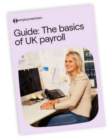
One of the biggest anxieties of any new employer is accidentally making a payroll mistake.
While we don’t want to add to your stress, it’s not an unfounded fear. There have been plenty of businesses in the UK that have made payroll mistakes – knowingly or unknowingly. And the consequences can be severe.
Not only can making a payroll error get you in hot water with the HMRC and breach employment regulations, it can also ruin a sense of trust within your team and threaten your business reputation.
However, there are plenty of things that you can do to protect your business from making a payroll mistake. Implementing HMRC-approved payroll software is one of them and gaining a deeper understanding of the UK payroll system can be invaluable.
Another great way to learn about what not to do? Look at some of the biggest payroll scandals in UK history.
Disclaimer: The information in this article is current as at 19 August 2022, and has been prepared by Employment Hero Pty Ltd (ABN 11 160 047 709) and its related bodies corporate (Employment Hero). The views expressed in this article are general information only, are provided in good faith to assist employers and their employees, and should not be relied on as professional advice. The Information is based on data supplied by third parties. While such data is believed to be accurate, it has not been independently verified and no warranties are given that it is complete, accurate, up to date or fit for the purpose for which it is required. Employment Hero does not accept responsibility for any inaccuracy in such data and is not liable for any loss or damages arising either directly or indirectly as a result of reliance on, use of or inability to use any information provided in this article.You should undertake your own research and to seek professional advice before making any decisions or relying on the information in this article.
What is payroll fraud?
Payroll fraud can be committed by an employee or an employer. In the case of an employee committing payroll fraud, this refers to the theft of funds from a business via the payroll system – generally resulting in a higher paycheck.
According to HRNews, the most common types of employee payroll fraud in the UK include;
- Buddy punching or ‘buddy clocking’, where an employee who is not present for work gets a friend to clock into their shift for them
- Ghost employees, where someone fails to notify their employer that they are still being paid after they have left a business
- Changes in pay rates, where the employee – or someone acting on behalf of the employee – increases their rate of pay in a payroll system
- Extending work hours, where the employee pads out their timesheets in small increments to make it appear like they have worked longer hours
- Fraudulent expense reimbursement, where an employee is reimbursed for expenses that never existed, or were less expensive than what the employee registered
- Fraudulent commissions, where an employee intentionally misreports or misrepresents their sales to gain more commission
- Failure to repay overpayments, where an employee does not return any overpayments accidentally made by the business
Payroll fraud can also be committed by employers. According to gov.uk, employer payroll fraud against the HMRC can include;
- Running a business without telling HMRC
- Not paying enough Income Tax or National Insurance
- Making false claims for the Coronavirus Job Retention Scheme
- Making false claims for Child Benefit or Tax Credits
- Not being registered for VAT when they should be
- Not charging VAT or other taxes on goods or services they sell
- Not paying VAT or other taxes on goods or services they buy
- Hiding money, shares or other assets in an offshore bank account
- Other types of tax avoidance or tax evasion
HR compliance is another essential part of managing employment. Download our Essential HR Compliance Guide for UK SMEs.

What if a business has been paying workers below National Minimum Wage?
Paying someone below the national standards could also get your business into serious trouble.
As stated on gov.uk, “It’s a criminal offence for employers to not pay someone the National Minimum Wage or National Living Wage, or to fake payment records.”
Employers who discover that they’ve accidentally been paying below minimum wage should pay back wages in arrears immediately. The UK government recommends that employers use this National Minimum Wage and National Living Wage calculator to check that an employee has been paid correctly.
HMRC have the right to carry out checks at any time and may ask to see payment records, so it’s important to keep the relevant records. If HMRC finds that an employer has not been paying minimum wage, arrears will have to be paid immediately and there may be a fine and other penalties.
What payroll records do businesses need to keep?
It’s an employer’s responsibility to keep the correct records to prove that they are paying their staff the minimum wage. According to gov.uk, records must be kept for at least 6 years if they:
- Were created on or after 1 April 2021, or
- Still had to be kept on 31 March 2021 under the previous rule that records must be kept for 3 years
Records can be kept in paper or digital forms, but for ease of access and reference we would always recommend keeping digital, cloud-based records. In-line with government requirements, “employers must be able to produce records for an individual pay reference period in a single document.”
Employers generally use their payroll records as proof of total pay (including pay deductions, allowances and tips) and total hours worked (including absences and overtime). They may also need to keep records such as agreements about working hours, pay and conditions (this may be noted in an employment contract) and documents that show why a worker is not entitled to the minimum wage.
Learn more about the National Minimum Wage and National Living Wage on gov.uk.
The essential guide to HR compliance
Examples of UK payroll errors and scandals
Let’s take a look at some recent examples of UK companies who have intentionally or unintentionally found themselves caught up in payroll scandals.
1. Tesco
Yes, the major supermarket chain was required to reimburse 140,000 staff members who were left underpaid due to a payroll error during 2017.
Tesco self-identified the errors during a review of a new payroll system, and had to pay back staff millions of pounds as a result. Due to the error, some staff were paid less than the National Living Wage after contributing part of their salary to pension, childcare and other schemes.
In an apology to staff, Tesco Chief Executive Matt Davies said; “As soon as our own review identified this issue we took immediate action to resolve it and establish which colleagues are affected. We’ve apologised to our colleagues and our priority now is to talk to them about how this affects them individually, and make any necessary payments.”
The Lesson
Payroll errors can happen, so it’s important to take steps to review payroll systems. If you spot an error you should, like Tesco, take immediate action to rectify the situation and apologise to your staff.
2. Sports Direct
In 2016, sports retailer Sports Direct was required to back pay workers at its Derbyshire base over one million pounds for non-payment of the minimum wage, following an investigation by HMRC. At the time, the trade union Unite said the payments could be worth up to £1,000 for some workers.
The company was also found to have a policy of fining staff for being late, as well as other negative findings concluded by a report from the Business, Innovation and Skills committee. One MP even suggested that Sports Direct’s working practices were similar to those of a ‘Victorian workhouse’ – yikes!
The Lesson
If an employer intentionally pays workers under minimum wage, they are breaking the law and there’s a high chance that HMRC or the relevant authorities will find out. Not only is the employer doing wrong by their staff, it’s likely there will be criminal penalties or investigations.
3. Primark
In 2017, fashion giant Primark was ordered to repay its employees £231,973.12, after being named on the government’s list for paying staff below the legal minimum wage. The store was one of 360 businesses that were identified by the government as failing to pay minimum wage that year, a record number.
The issue mainly arose over the retailer charging staff for uniforms. The company has since confirmed it has reviewed its procedures to stop the situation from occurring again.
The Lesson
Employers should be very cautious when it comes to deductions from their employees’ salaries, especially when it comes to things like uniforms or other equipment required to complete a role. Always seek personalised advice and support from an employment lawyer if you are unsure how these costs and rules apply to your specific situation.
4. Debenhams
In another scandal from 2017, former high street hallmark Debenhams was found to have underpaid 11,858 workers an amount of £134,894.83 as a result of an HMRC investigation.
The department store chain was forced to pay back the full amount it had failed to pay its employees, and was fined £63,000 for its mistake.
The Lesson
This is another reiteration that HMRC can and do run regular audits on businesses to make sure that they are doing the right thing.

5. Wagamama
Restaurant chain Wagamama topped the government’s ‘name and shame’ list in 2018, an error that – similarly to Primark – the company put down to an “inadvertent misunderstanding” of how minimum wage applied to uniforms.
The business was required to repay £133,212 to 2,630 workers as a result.
For a similar reason, fashion retailer Karen Millen was forced to repay £9,847 to 28 workers, at a cost of nearly £352 each. The HMRC audit had found that many staff were paid less than the minimum wage, due to being required to wear the brand’s clothing as a uniform, purchased by the employee at a discount.
The Lesson
Employers need to think carefully about the associated costs of uniforms and how it fits into an employee’s salary, otherwise they could be at risk of underpayment.
6. Football clubs
It’s not just big retailers and chains who have been found out for minimum wage breaches – several football clubs have been highlighted by the government’s ‘name and shame’ list for underpayment of their staff.
On the 2017 list, Scottish clubs Motherwell, Greenock Morton and Falkirk appeared for not paying minimum wage. According to the BBC, “Motherwell failed to pay £2,755.34 to 12 workers, with Greenock Morton keeping £2,382.46 from six members of staff. Falkirk had to pay back £495 owed to one worker.”
A spokesperson for Motherwell attributed the underpayments to an administrative error.
The Lesson
Regardless of industry, HMRC is looking out for companies that are doing the wrong thing.
7. Furlough fraud
While we’re not pointing the finger at one company in particular for this one, it’s worth noting the large amount of fraud and subsequent investigations that surrounded the Covid furlough payments.
The Coronavirus Job Retention Scheme, commonly known as the ‘Furlough Scheme’, saw a huge amount of payroll fraud. In November 2021, it was reported that over £5.5bn of scheme funds was lost to payroll fraud or error.
HMRC is continually investigating businesses that have been fraudulently claiming furlough funds.
The Lesson
It’s not just underpayment that the government is looking out for, fraudulent claims of funds and grants are also on their list of audits. Employers should make sure that, if they participate in a scheme, they fully understand the parameters of the scheme and the records that they need to keep.
Don’t risk getting payroll wrong
Most businesses, especially emerging small and medium-sized enterprises (SMEs), would never intentionally make a payroll mistake, but administrative errors can and do happen.
If there’s one thing we’ve learned from revisiting these payroll scandals, it’s that HMRC audit businesses regularly and they’re not afraid to name and shame employers that are doing the wrong thing.
That’s why we recommend that employers always stay up-to-date with rate changes and employment laws, check in with their staff regularly and seek help with payroll if needed. Implementing payroll software can also help.
What is payroll software?
A well-designed payroll software system like Employment Hero Payroll can help you stay compliant. Our HMRC-approved platform has lots of helpful features that can help you easily pay your employees and assist with workforce planning. Book a demo with one of our business specialists now.
Guide to Payroll in Australia



